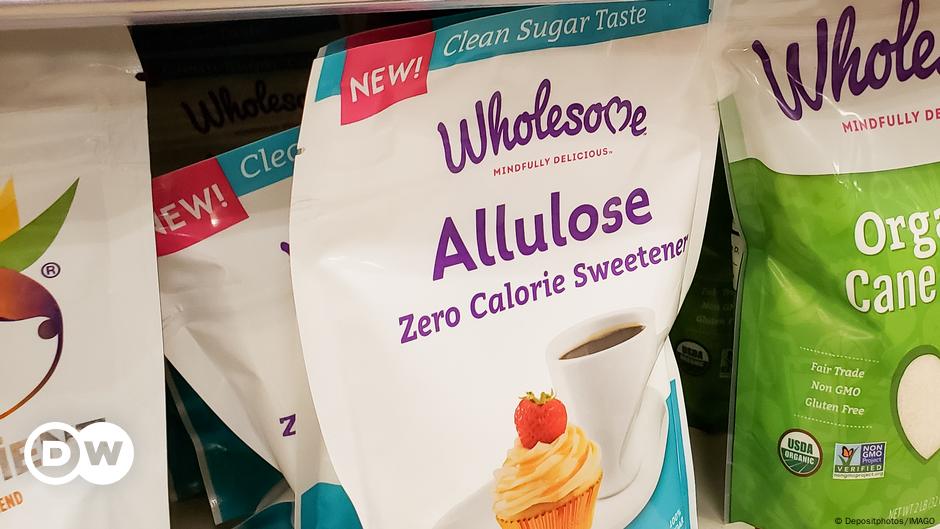Allulose is a rare form of sugar that was first identified in wheat leaves in the 1940s. However, it remained little used and poorly researched.
That was until Ken Izumimori, a professor at Japan’s Kagawa University Faculty of Agriculture, arrived in the 1990s. Izumimori discovered a microorganism in soil near the university that uses enzymes to convert fructose into allulose.
It took another 20 to 30 years of research, but allulose is now gradually gaining popularity as a sweetener or sugar replacement in the United States and South Korea, and has been approved for commercial use.
Allulose (also known as D-allulose and D-psicose) is still considered rare, as it is found in small amounts in figs, raisins, kiwi, wheat, maple syrup, and molasses.
It is said to be about 70% sweeter than traditional sugar (sucrose), but has only 10% of the calories. In fact, you may see it advertised as having zero calories, good for weight management, or beneficial for people with type 2 diabetes.
Are the claims supported by scientific evidence? Let’s take a look.
Is allulose a zero calorie sweetener?
The U.S. regulatory agency, the Food and Drug Administration (FDA), has approved the use of allulose in foods as “generally recognized as safe.”
However, the European Union, Canada, and other countries consider allulose to be a novel food whose safety has not yet been fully evaluated.
That’s why scientists are still evaluating the effects of allulose on our bodies.
Recent studies have shown that the body absorbs allulose but does not metabolize it. This means that allulose may be glucose and calorie free.
In other words, the body does not realize that allulose contains energy in the form of calories, and is therefore “fooled” into excreting most of the calories.
For this reason, allulose may be useful for people who want to lose weight but still enjoy sweets from time to time. It’s the same reason that allulose is also helpful for people on a ketogenic diet, a diet that is as low in carbohydrates as possible (sugar is a carbohydrate).
There is also evidence that allulose does not cause cavities like sugar.
Glycemic Index: How does allulose compare to sugar?
There are also claims that allulose does not increase blood sugar levels.
The glycemic index (GI) ranks foods based on how quickly they are digested and raise blood sugar levels.
Pure sugar raises blood sugar levels by 65 on a scale of 0 to 100.
The GI value of white bread is 100. White bread takes longer to digest and significantly increases blood sugar levels.
However, evidence shows that allulose does not raise blood sugar levels at all.
Is allulose suitable for people at risk of type 2 diabetes?
Allulose appears to have little or no effect on blood sugar levels, so it may be an ideal sugar replacement for people with or at risk for type 2 diabetes.
Studies have shown that even high doses of allulose do not cause fluctuations in blood sugar levels in diabetics or healthy people.
Some studies have found that eating allulose lowers postprandial glucose and insulin levels and reduces the amount of glucose and insulin fluctuations in the blood.
This may be good news for diabetics whose insulin systems are less effective and cannot effectively regulate blood sugar levels.
However, further evidence is needed from large clinical trial-type studies to support the claim that allulose is beneficial for diabetics.
Does nature always mean health?
Allulose is a useful sweetener in commercial foods such as chocolate because it does not have a strong aftertaste.
“I reduced my calories. [in our chocolate] By replacing sugar with a nearly calorie-free alternative, you can save up to 40%,” said Michelle Auten, founder of GOALZ, which uses only allulose to sweeten its products.
They’re looking for “something that’s found in nature, not something that’s been created by tinkering with molecules in a lab,” Auten said. However, the label that allulose is natural and healthy can be deceptive.
For example, there are indications that ingesting large amounts of allulose may cause abdominal pain, diarrhea, bloating, or gas.
Table sugar, like allulose, is natural. It is obtained from the sugar beet or sugarcane plant. In fact, allulose can be made by changing the chemical form of fructose using enzymes.
The list of health concerns from sugar intake is long. Diabetes, heart disease, depression, tooth decay, skin irritation, and cancer, to name a few. Natural isn’t always healthy.
What about allulose as a sugar substitute? Many regulatory agencies claim that it is not harmful to eat, especially when compared to sugar. However, further research is needed to know whether allulose has beneficial effects on health.
This article was written by Lilia Breytenbach during her internship at the DW Faculty of Science, with support from Zulfikar Abany and Fred Schwaller.
source:
Effects of D-allulose on glucose tolerance and insulin response to standard oral sucrose loading: Results of a prospective randomized crossover study presented by Franchi, F. et al. Published in the journal BMJ Open Diabetes Research & Care (2021) https://doi.org/10.1136/bmjdrc-2020-001939
Allulose in the human diet: known and unknown, by Daniel H., Hauner H., Horneff M., and Clavel T., published in British Journal of Nutrition (2022). doi: 10.1017/S0007114521003172.

